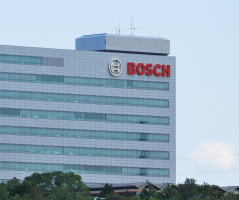— A class-action lawsuit against the Robert Bosch company filed by Volkswagen dealers concerning the role Bosch played in Volkswagen's emissions scheme won't be dismissed by a federal judge.
Judge Charles Breyer of the U.S. District Court for the Northern District of California approved the $1.67 billion settlement for hundreds of VW dealerships that sued the automaker.
The dealer lawsuit alleges that Bosch worked with Volkswagen to sell as many of the “clean-diesel” vehicles as possible by misrepresenting the diesel vehicles as good for the environment and in compliance with federal laws.
The dealers said Bosch worked with Volkswagen to equip diesel vehicles with emissions "defeat devices" that caused the cars to pass emissions tests in the lab, but were illegal to drive on the roads.
Franchise dealers across the country purchased diesel vehicles from Volkswagen and sold those vehicles to consumers, unaware of the defeat devices. Dealers didn't learn the cars sitting on their lots were useless until the Environmental Protection Agency (EPA) announced the fraud.
The judge said in court documents the actions of VW and Bosch made the diesel vehicles "unsaleable."
Based on the lawsuit, the defeat devices in the diesel cars are part of the electronic control units which controls engine and emission controls known as EDC17. But Bosch and Volkswagen worked together to turn the EDC17 into a defeat device, something VW couldn't have modified without Bosch’s involvement.
In fact, the lawsuit says Bosch typically locked the EDC17 to prevent customers from making significant changes on their own.
Bosch tried to convince the judge the ruling wasn't fair, but the judge upheld all claims that the company was a knowing participant in a scheme to defraud dealers and customers.
The lawsuit includes internal VW emails that reference Bosch in the illegal activity. An email from 2006 is a good example, in which Dieter Mannigel, of the U.S. diesel engines division, emailed Hanno Jelden, head of Volkswagen’s powertrain electronics division, about the “US07” project.
“Have you spoken with Bosch about the issue of US07 ...?
This issue is slowly becoming critical ....
I came away from our meeting with Mr. Krebs [who joined Volkswagen from Audi in 2005] with the following:
When we use the ‘acoustic function,’ it should have an appearance that won’t get us in trouble ....
He is very skeptical about its implementation on the U.S. market: for one thing due to the very critical liability situation....
In my opinion, the requirement of ‘nondiscoverability’ has neither been met for today’s function nor the planned expansion.
The FP sheet for the expansion has been submitted to Bosch.
How do we proceed?”
In relation to the email, the judge wrote:
“The express references in this email to the ‘acoustic function,’ the ‘US07’ project, and the importance of not getting caught illustrate Volkswagen’s deception in undertaking the emissions scheme. But the email also casts Bosch as a strategic partner in the scheme. The ‘issue’ discussed appears to be how to implement the ‘acoustic function’ in the U.S. without being discovered. And Mannigel asks if Jelden has ‘spoken with Bosch about the issue,’ suggesting that Bosch might be able to help hide the “acoustic function” from U.S. regulators.”
Read about the VW and Bosch emissions fraud here.

